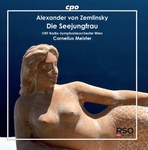|
Back
12/26/2017
Alexander von Zemlinsky: Die Seejungfrau – Es war einmal
ORF Radio-Symphonieorchester Wien, Cornelius Meister (conductor)
Live recording: Wiener Konzerthaus (May 28, 2010) – 55’34
cpo # 777 762-2 – Booklet in German and English (Distributed by Naxos of America)

   
Personally, Alexander von Zemlinky’s works hold great fascination, owning itself to approachable mysteries lurking around every noted corner with an addictive draw due to its undeterminable journey. But before discussing the music at hand, the topic of the pamphlet needs addressing. In a nutshell: it’s downright flummoxing. Since Zemlinsky isn’t a household name, this cautions “the” booklet to be a pithy document in advance of a listen. Eckhardt van den Hoogen’s dissertation blatantly befuddles and frustrates. Firstly, it’s poorly written (i.e. capacious run-on-sentences); secondly, ideas are expressed in a bloviated, egocentric manner; and thirdly, thoughts are not logically presented in facile construct…[what are we reading?...where are we going?] Due to the poor development (and questionable editing, translated by Susan Marie Praeder), this entirely throws off the music as a whole.
Die Seejungfrau (The Little Mermaid) (1905) resembles that of Richard Strauss’ symphonic poems by painting in strength and might, though Alexander von Zemlinsky had an affinity to conjure unique melodic circumstances, grounded in determination and attitude. Overall, the ORF Radio Orchestra helps bring out the many textures of the music. “Generalized fulfillment”...is what can be said of Die Seejungfrau with its bowl of lushness alongside harsh hits of irascibility.
The opening moodiness elicits the sea’s tenebrous bottom where the mermaid lives. A solo violin lovingly portraits the “Yearning for the world” motif. While Dukas’ The Sorcerer’s Apprentice wriggles into the perspective (9’25), they’re also clear shades of Korngold’s cinematic pops. If one’s familiar with Zemlinsky operas, the music continues to flicker at Der Zwerg (in a live performance) and Der Zwerg (on DVD) (1922.) It’s better to sit back and simply “soak up” Zemlinsky.
Die Seejungfrau’s third movement murkily opens on a path of enigmatic uncertainty and permeable loneliness, and the ensuing horns are especially radiant. Within the closing bars, we return to crystalline hopefulness and melodramatic folds as found in the conclusive Ariadne auf Naxos (1912.) (Never does one truly grasp the entire story.)
The balance of cpo’s CD delves into two snippets pulled from the 1900 opera, Es war einmal (Once upon a time) (1900.) The introductory selection, “Prelude”, hints at Parsifal with Zemlinsky articulating pulsating ebbs and flows with mesmerizing flourishes. Meanwhile, the “Interlude to Act I” distantly hints at Dvorák’s “Polonaise” from Rusalka (1901); the piece’s second half hums along with a lilting and intentionally amiable, powerful élan with bubbly demeanor.
Occasional background noise invades the recording, yet the friction’s kept to a minimum, and Cornelius Meister gives Zemlinsky a palpable reading. The biggest blockade to this release is the write-up...it generates an impervious obstacle to the music.
Christie Grimstad
|